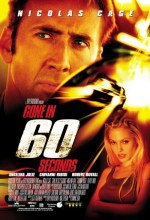It's a sentiment that has merit. After all, why should entertainment
be work? Most people would agree that a film that is both thoughtful and
entertaining is desirable, but if the filmmakers only strive for the latter,
should it be held against them? I'm not even sure that a film can strive
to be completely mindless. Gone in 60 Seconds does attempt to identify
moral parameters and create characterizations, but they're hackneyed and uncompelling.
The film's strength is its action sequences. Here, content is brushed aside
in favor of sensation. It doesn't matter why Nicolas Cage is driving a 1967
Ford Mustang 160 mph down a Los Angeles waterduct. What matters is the sound
of the engine roaring, the smoke slithering out from the tires, and the look
of determination in Cage's eye. These moments pop up intermittently in the
movie. For a film whose worth depends on its ability to thrill, Gone in
60 Seconds is only fitfully entertaining.
The story is a simple one that scoots us from one action scene
to the next, despite having several parasitic subplots. Nicolas Cage is Memphis
Raines, a retired car thief extraordinaire who now teaches children racecar
driving. He gets a call one day that forces him back into the business. His
kid brother Kip (Giovanni Ribisi) has gotten in over his head. Since Memphis
retired and moved out of town six years ago, Kip has become an up-and-coming
car thief. He has contracted with a local crime lord named Raymond Calitri
(Christopher Eccleston) to steal fifty expensive cars. When Kip's crew bungles
the job and the bosses' reputation is threatened, Calitri gets mad... very
mad. He threatens to kill Kip unless Memphis can bring in all fifty cars in
three days. It's a premise so basic that it has to work (and it has
worked, in a bazillion other movies, Rounders for example. Even though
we don't know Kip and he's probably a little scumbag (he steals cars, after
all), we want to see if Memphis can pull off the unlikely task. Never mind that these cars actually belong to people–a potential scumbag's
life is at stake!
Never mind that these cars actually belong to people–a potential scumbag's
life is at stake!
Memphis has his work cut out for him. As if the task weren't
gargantuan enough, he has to reassemble his old team and fend off the hostilities
of a rival crime lord who's upset the contract didn't go to him. Memphis manages
to scrap together a crew: his scraggly mentor Otto (Robert Duvall, probably
not the first car mechanic named "Otto"), wisecracking Kenny (Chi McBride),
taciturn Sphinx (Vinnie Jones), and supposedly sexy Sway (Angelina Jolie).
Sway is reluctant to join because she and Memphis had a history before he
walked out on the gang. (Cue Fight Club:
I am Jack's Complete Lack of Surprise.) Without explaining her change of mind,
Sway eventually joins the group. Memphis' merry band of thieves is bolstered
by Kip's crew, a collection of brash punks and computer geeks. The mix between
the old school and the new occasionally causes friction.
The story suffers by giving Memphis too many adversaries. He's
pulled in so many directions at once that the story spins out when it should
be racing forward. The emotional center of the film is Memphis' relationship
with his brother. Kip resents Memphis' decision to leave six years ago, and
Memphis takes his time explaining to Kip why he left. Memphis also has issues
with Sway for many of the same reasons. There's also trouble outside Memphis'
crew in the form of Calitri. He's presented as straightforwardly evil, though
writer Scott Rosenberg gives him a penchant for carpentry for no apparent
reason. The aforementioned rival gang lord is also on Memphis' case for spurning
him to deal with Calitri. To top it all off, the antagonists given the most
screen time are a police detective duo, Castlebeck (Delroy Lindo) and Drycoff
(Timothy Olyphant). Castlebeck is Memphis' long-time nemesis and worthy foe,
the type who conjures up respect for his adversary after numerous failures
to apprehend him. All of these conflicts with Memphis are eventually resolved,
two of them are even taken care of with a single action that can be seen as
tidy or contrived, depending on your disposition.
AboutFilm.Com
The Big Picture
|
| Alison |
-
|
| Carlo |
C
|
| Dana |
B
|
| Jeff |
C
|
| Kris |
-
|
| ratings explained |
Gone in 60 Seconds runs out of gas just before
its climax, which is a shame. An extended chase scene is the highlight of
the film. It's difficult to get a handle on the chase because it's not as
streamlined as the more harrowing ones in Ronin and Bullitt;
however, it serves its purpose in cutting a swath of fiery destruction and
leaving crumpled police cars in its wake. Once the chase is over, though,
we end up in the most cliched of action-movie locations, the abandoned warehouse.
The resolution is one of those "only in the movies" moments that is predictably
warm and fuzzy.
The large cast, which includes three Oscar-winners, is largely
wasted. Angelina Jolie, in particular, adds nothing to the film and her third-billing
is puzzling. At the center, Nicolas Cage tones down the shtick and lets the
other actors ham it up for a change. The downside is that Memphis' character
is unmemorable and hazy. The main villain, Christopher Eccleston, doesn't
seem to know what to do in a big-budget action film. His glowering, which
worked so well in Elizabeth, is too
subtle in this film, where he has to compete with lines like, "this snake
is crawling up my ass!" Vinnie Jones and Delroy Lindo come off the best, somehow
communicating more than their rote characterizations call for.
Director Dominic Sena's last film was Kalifornia, but
there's no evidence of that work in this film, further supporting the notion
that Bruckheimer holds the reins here. The pacing is competent though. One
thing I can say about Gone in 60 Seconds is that I wasn't bored, and
wrapping everything up in under two hours deserves a medal these days.
Now that you'e reached the end of the review, I know you all
are waiting with bated breath to see if I make some clever joke about the
title of the film and its ephemeral quality. My only lasting impression
is of the staggering amount of time and preparation that must have gone into
constructing the numerous stunts and special effects. Gone in 60 Seconds
tries hard to please, but then, so do commercials, and those are usually
gone in half the time.
Review
© June 2000 by AboutFilm.Com and the author.
Images © 2000
Touchstone Films. All Rights Reserved.

 Never mind that these cars actually belong to people–a potential scumbag's
life is at stake!
Never mind that these cars actually belong to people–a potential scumbag's
life is at stake!
